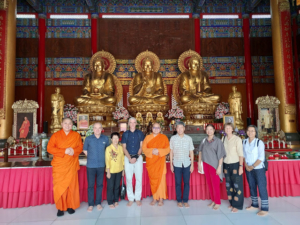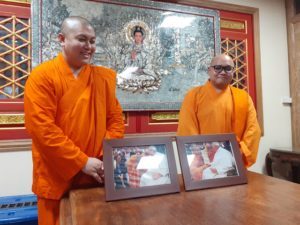Nostra Aetate Foundation Scholarships: Pathways to Interreligious Dialogue
Roberto Catalano, Sophia University Institute
April 22, 2023
On the website of the Dicastery for Interreligious Dialogue, we read as follows:
“Created in 1990, the Nostra Aetate Foundation promotes interreligious dialogue through education by granting scholarships to eligible people, followers of other religions, who desire to deepen their knowledge of Christianity through study at the Pontifical academic institutions in Rome, Italy. Upon their return to home countries, enriched by awareness and experiences of Christianity, they are well prepared to participate in on-going dialogue activities”.
Over the past 15 years I have gotten to know many students, especially Muslims and Buddhists, who came to Rome to study Christianity and then turned out to be true pioneers in interfaith dialogue. I could make a long list. The idea of establishing scholarship to foster knowledge of the Christian faith and tradition among people of different religions turned out to be a brilliant insight. I had proof of this again today, visiting, here in Bangkok, where I am for a few days, a Mahayana Buddhist temple (Thailand is the capital of the other great Buddhist tradition, the inayana or theravada). Some friends have invited me to visit two monks who recently returned just from Rome where they spent several months on Nostra Aetate fellowships. Our little group of seven Catholics from different backgrounds (Thai, Italian, German, and Filipino) were very warmly welcomed as one is always welcomed in Thailand at any time of the year or day.
It was 11:15 a.m. and, in temples in this part of the world, monks use to eat their lunch at that time. Dinner, in the evening around 6 p.m., consists only of some liquids: a soup or yogurt. We were, therefore, faced with a table set with Thai food served with elegance and finesse and of excellent quality. Everything, of course, was vegetarian with great richness of taste. Then, the two monks who had just returned from Rome and had lunch with their colleagues and confreres, took us into their care and truly showered us with affection, gratitude and cultural and religious richness. Their desire to express all their gratitude for what they had experienced in Rome at the Sant’Anselmo Institute (of the Benedictines) and the Pontifical University of the Angelicum was evident. The whole thing was coordinated by the Dicastery for Interreligious Dialogue, especially thanks to Father Markus Solo, an Indonesian SVD priest, who is an expert on Islam.
We were able to visit the entire temple, founded by a monk of Chinese origin who died a few years ago and whose ashes are contained in a tall building at the entrance to the large complex. The vocation of this Buddhist center is to promote the education of young people (especially those who cannot afford it), to establish centers of traditional Chinese medicine to which sick people can turn, as well as also to foster a devotion to the bodhisattvas of Mahayana Buddhism. A social service, then, as it is always typical of this Buddhism, which is known to come from China and Vietnam and is developed in the Far East, while the Teravada Buddhism is more present in Southeast Asia. The two monks went on to show us the most sacred places in their temple, had us interact with a group of very young monks (all in their teens or early twenties) who were extremely shy and to whom they explained who we were and what they had done during their time in Rome.
We also talked at length about their studies, their texts at the end of their time in Italy, and how much they even understood about the Christian Trinity, trying to identify ways of how to explain it, as much as possible, in Buddhist terms. But, perhaps the most touching moment of the day was when they told us about their meeting with Pope Francis.
 They showed us the photos and were moved again by the memory of something that marked them deeply. In the face of this but, I would say, of all the time spent with these two monks, one grasps the wisdom of those who conceived this opportunity to invite people of different religions to Rome to learn about the Christian faith and, above all, to support them for their expenses and stay. It is a true heritage that is built up over the years and that directs more and more toward the ways of dialogue. Indeed, knowledge and life together bring people closer, while bringing down barriers, as was felt today where, beyond the dressing styles, geography and religion of each, we discovered ourselves to be true brothers and sisters. What reigned supreme in this contact was mutual trust, openness and gratitude, all of which are fundamental to dialogue.
They showed us the photos and were moved again by the memory of something that marked them deeply. In the face of this but, I would say, of all the time spent with these two monks, one grasps the wisdom of those who conceived this opportunity to invite people of different religions to Rome to learn about the Christian faith and, above all, to support them for their expenses and stay. It is a true heritage that is built up over the years and that directs more and more toward the ways of dialogue. Indeed, knowledge and life together bring people closer, while bringing down barriers, as was felt today where, beyond the dressing styles, geography and religion of each, we discovered ourselves to be true brothers and sisters. What reigned supreme in this contact was mutual trust, openness and gratitude, all of which are fundamental to dialogue.
